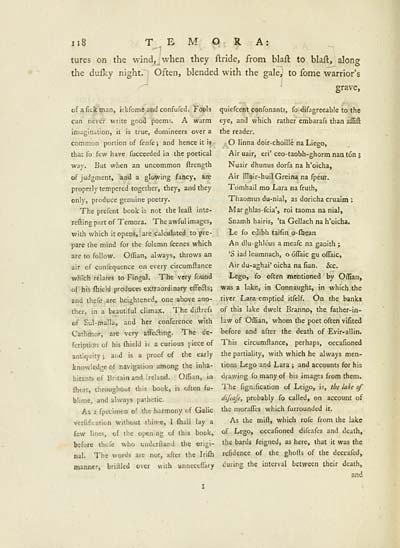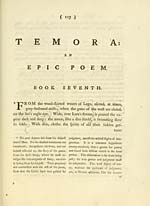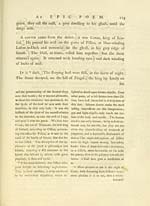Download files
Complete book:
Individual page:
Thumbnail gallery: Grid view | List view

ii8
T E M O R A:
tures on the wind, when they ftride, from blafl to blafl, along
the dulky night. Often, blended with the gale, to fome warrior's
of afickman, irkfome and confufed. Fools
can never write good poems, A warm
imagination, it is true, domineers over a
common portion of fenfe; and hence it is
that fo few have fuccceded in the poetical
way. But when an uncommon ftrength
of judgment, and a glowing fancy, are
properly tempered together, they, and they
only, produce genuine poetry.
The prefent book is not the leaft inte-
refting part of Temora. The awful images,
with which it opens, are calculated to pre-
pare the mind for the folemn fcenes which
are to follow. Offian, always, throws an
air of confequence on every circumflance
which relates to Fingal. The very found
of his fliicld produces extraordinary effefls;
and thgfe are heightened, one above ano-
ther, in a beautiful climax. The diflrefs
of Sul-malla, and her conference with
Cathmor, are very affec'\ing. The de-
fcription of his fliield is a curious piece of
antiquity ; and is a proof of the early
knowledge of navigation among the inha-
bitants of Britain and Ireland. Offian, in
ihorr, throughout this book, is often fu-
blime, and always pathetic.
As a fpecimen of the harmony of Galic
verfifitation without rhime, 1 (hall lay a
few lines, of tiie open.ng of this book,
before thofe who undtrfland the origi-
nal. The words are not, after the Irifh
manner, briitied over v\ith unnectfiary
grave,
quiefcent confonants, fo difagreeable to the
eye, and which rather embarafs than aflift
the reader.
O linna doir-choille na Liego,
Air uair, eri' ceo-taobh-ghorm nan ton ;
Nuair dhunus dorfa na h'oicha.
Air illuir-huilGreina na fpeur.
Tdmhail mo Lara na fruth,
Thaomus du-nial, as doricha cruaim :
Marghlasfcia', roi taoma na nial,
Snamh hairis, 'ta Gellach na h'oicha.
Le fo edibh taifin o-fhean
An dlu-ghlcus a meafc na gaoith ;
'S iad leumnach, o ofTaic gu ofTaic,
Air du-aghai' oicha na fian. &c.
Lego, fo often mentioned by Oflian,
was a lake, in Connaught, in which the
river Lara emptied itfelf. On the banks
of this lake dwelt Branno, the father-in-
law of Offian, whom the poet often vifited
before and after the death of Evir-allin.
This circumflance, perhaps, occafioned
the partiality, with which he always men-
tions Lego and Lara ; and accounts for his
drawing fo many of his images from them.
7'he fignification of Leigo, is, the lake of
difiafe, probably fo called, on account of
the moraffes which furrounded it.
As the mift, which rofe from the lake
of Lego, occafioned diftafes and death,
the bards feigned, as here, that it was the
refidence of the ghofls of the deceafed,
during the interval between their death,
and
T E M O R A:
tures on the wind, when they ftride, from blafl to blafl, along
the dulky night. Often, blended with the gale, to fome warrior's
of afickman, irkfome and confufed. Fools
can never write good poems, A warm
imagination, it is true, domineers over a
common portion of fenfe; and hence it is
that fo few have fuccceded in the poetical
way. But when an uncommon ftrength
of judgment, and a glowing fancy, are
properly tempered together, they, and they
only, produce genuine poetry.
The prefent book is not the leaft inte-
refting part of Temora. The awful images,
with which it opens, are calculated to pre-
pare the mind for the folemn fcenes which
are to follow. Offian, always, throws an
air of confequence on every circumflance
which relates to Fingal. The very found
of his fliicld produces extraordinary effefls;
and thgfe are heightened, one above ano-
ther, in a beautiful climax. The diflrefs
of Sul-malla, and her conference with
Cathmor, are very affec'\ing. The de-
fcription of his fliield is a curious piece of
antiquity ; and is a proof of the early
knowledge of navigation among the inha-
bitants of Britain and Ireland. Offian, in
ihorr, throughout this book, is often fu-
blime, and always pathetic.
As a fpecimen of the harmony of Galic
verfifitation without rhime, 1 (hall lay a
few lines, of tiie open.ng of this book,
before thofe who undtrfland the origi-
nal. The words are not, after the Irifh
manner, briitied over v\ith unnectfiary
grave,
quiefcent confonants, fo difagreeable to the
eye, and which rather embarafs than aflift
the reader.
O linna doir-choille na Liego,
Air uair, eri' ceo-taobh-ghorm nan ton ;
Nuair dhunus dorfa na h'oicha.
Air illuir-huilGreina na fpeur.
Tdmhail mo Lara na fruth,
Thaomus du-nial, as doricha cruaim :
Marghlasfcia', roi taoma na nial,
Snamh hairis, 'ta Gellach na h'oicha.
Le fo edibh taifin o-fhean
An dlu-ghlcus a meafc na gaoith ;
'S iad leumnach, o ofTaic gu ofTaic,
Air du-aghai' oicha na fian. &c.
Lego, fo often mentioned by Oflian,
was a lake, in Connaught, in which the
river Lara emptied itfelf. On the banks
of this lake dwelt Branno, the father-in-
law of Offian, whom the poet often vifited
before and after the death of Evir-allin.
This circumflance, perhaps, occafioned
the partiality, with which he always men-
tions Lego and Lara ; and accounts for his
drawing fo many of his images from them.
7'he fignification of Leigo, is, the lake of
difiafe, probably fo called, on account of
the moraffes which furrounded it.
As the mift, which rofe from the lake
of Lego, occafioned diftafes and death,
the bards feigned, as here, that it was the
refidence of the ghofls of the deceafed,
during the interval between their death,
and
Set display mode to: Large image | Transcription
Images and transcriptions on this page, including medium image downloads, may be used under the Creative Commons Attribution 4.0 International Licence unless otherwise stated. ![]()
| Early Gaelic Book Collections > J. F. Campbell Collection > Temora, an ancient epic poem, in eight books > (130) |
|---|
| Permanent URL | https://digital.nls.uk/82179455 |
|---|
| Description | Volumes from a collection of 610 books rich in Highland folklore, Ossianic literature and other Celtic subjects. Many of the books annotated by John Francis Campbell of Islay, who assembled the collection. |
|---|
| Description | Selected items from five 'Special and Named Printed Collections'. Includes books in Gaelic and other Celtic languages, works about the Gaels, their languages, literature, culture and history. |
|---|

